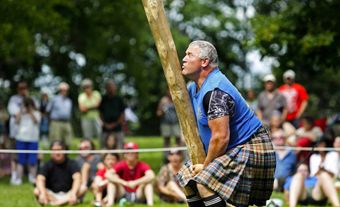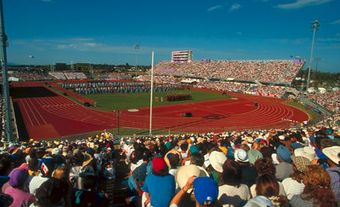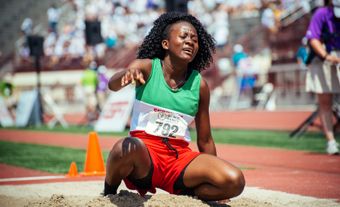The Pan American (Pan Am) Games are a multi-sport event for the nations of the Western Hemisphere, held every four years. They are conducted in a similar manner to the Olympic Summer Games and held one year prior to them. The Games are an opportunity for athletes to compete at the international level, particularly in preparation for the Olympic Summer Games. They are the third largest international multi-sport Games, after only the Olympics and the Asian Games. (Since 1999, the Pan Am Games have been followed by the Parapan American Games.)
The Games
Athletes from 41 countries in the Americas and the Caribbean compete in the Games, which are governed by the Pan American Sports Organization (PASO). Participating countries must have an established National Olympic Committee that is recognized by the International Olympic Committee and affiliated with PASO.
A comparatively recent event, the first Pan Am Games were held at Buenos Aires (Argentina) in 1951, when 19 nations were officially represented in 18 sports (Canada did not officially compete in the first Games). Since then they have been celebrated in nine others countries across the Americas and the Caribbean.
|
Year |
Location |
|
1951 |
Buenos Aires, Argentina |
|
1955 |
Mexico City, Mexico |
|
1959 |
Chicago, Illinois, USA |
|
1963 |
São Paulo, Brazil |
|
1967 |
|
|
1971 |
Cali, Colombia |
|
1975 |
Mexico City, Mexico |
|
1979 |
San Juan, Puerto Rico |
|
1983 |
Caracas, Venezuela |
|
1987 |
Indianapolis, Indiana, USA |
|
1991 |
Havana, Cuba |
|
1995 |
Mar del Plata, Argentina |
|
1999 |
|
|
2003 |
Santo Domingo, Dominican Republic |
|
2007 |
Rio de Janeiro, Brazil |
|
2011 |
Guadalajara, Mexico |
|
2015 |
In 1990, Las Leñas in Argentina hosted the first (and only) Winter Pan Am Games. There was little interest among member countries in the winter version of the Games and the concept was abandoned.
Sports
The Pan Am Games include all sports, events and disciplines that will be on the official programme of the next Olympic Summer Games (which follow a year later). They may also include a number of non-Olympic sports recognized by the Pan American Sports Organization (PASO).
|
Sports at the 2015 Pan Am Games |
||
|
Modern Pentathlon |
||
|
Rugby Sevens |
||
|
Taekwondo |
||
|
Waterski/Wakeboard |
||
Canada at the Games
Canada did not officially compete in the 1951 Games (although a small group of Canadian swimmers did give a demonstration in synchronized swimming), but it has been a consistent and successful competitor ever since, with Canadian athletes providing many world-class performances in a variety of sports.
The fifth Pan Am Games, held at Winnipeg, proved a fitting celebration for Canada's Centennial Year (1967), when 2,451 athletes from 29 countries participated in 29 sports. By 1999, when Winnipeg again hosted the Games, there were over 40 Western Hemisphere countries in attendance. It was only the second time that Canada had hosted the event. At the 1999 Games, Canadians won 196 medals in total (64 gold medals, 52 silver and 80 bronze), an increase of 19 medals over the 1995 Games in Mar del Plata.
The 2003 Pan Am Games in Santo Domingo were not as successful for the Canadian team; out of a total of 128 medals, they won 29 gold, 57 silver and 42 bronze. At the Games in Rio de Janeiro in 2007, Canada won a total of 137 medals (39 gold, 43 silver, 55 bronze), exceeding its total of 128 medals won in 2003. At Guadalajara in 2011, Canadian athletes won 30 gold, 40 silver and 49 bronze for a total of 119 medals. Canada is currently ranked third behind the United States and Cuba for all-time medal wins.
|
Canadian Medals and Ranking |
||||||
|
Year |
Host |
Rank |
Gold |
Silver |
Bronze |
Total |
|
1955 |
Mexico City |
5th |
4 |
4 |
3 |
11 |
|
1959 |
Chicago |
5th |
5 |
19 |
24 |
48 |
|
1963 |
São Paulo |
3rd |
10 |
27 |
25 |
62 |
|
1967 |
2nd |
12 |
37 |
43 |
92 |
|
|
1971 |
Cali |
3rd |
19 |
20 |
42 |
81 |
|
1975 |
Mexico City |
3rd |
18 |
35 |
38 |
91 |
|
1979 |
San Juan |
3rd |
24 |
43 |
70 |
137 |
|
1983 |
Caracas |
3rd |
22 |
42 |
55 |
119 |
|
1987 |
Indianapolis |
3rd |
30 |
57 |
75 |
162 |
|
1991 |
Havana |
3rd |
22 |
46 |
59 |
127 |
|
1995 |
Mar del Plata |
3rd |
47 |
61 |
69 |
177 |
|
1999 |
3rd |
64 |
52 |
80 |
196 |
|
|
2003 |
Santo Domingo |
3rd |
29 |
57 |
42 |
128 |
|
2007 |
Rio de Janeiro |
4th |
39 |
44 |
55 |
138 |
|
2011 |
Guadalajara |
5th |
30 |
40 |
49 |
119 |
|
2015 |
2nd | 78 | 69 | 70 | 217 | |

 Share on Facebook
Share on Facebook Share on X
Share on X Share by Email
Share by Email Share on Google Classroom
Share on Google Classroom






